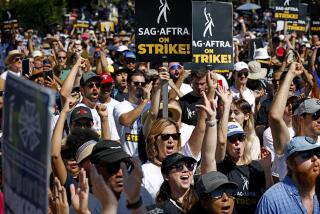How to know when your jobless benefits will run out
- Share via
Congress couldn’t agree to extend unemployment benefits, which means millions of jobless Americans will stop receiving checks from the government. But the payments aren’t immediately stopping for everyone who receives them — it’s more of a slow fade-out.
So how do you know when you’re going to lose your benefits?
The explanation requires a little background. Typically, unemployed workers who meet their state’s requirements receive 26 weeks of benefits. But a series of federal extensions granted during the deep economic downturn increased that number to 99 weeks in California and some other states. That figure includes four tiers, or extensions, of benefits, and a fifth tier called FED-ED that is available only in some states with high unemployment rates, including California.
Since Congress did not authorize further extensions, unemployed people will not be able to move from one series of benefits to the next. Here’s what that means if you’re unemployed:
• If you have been out of work for a few weeks and are on the first tier of regular unemployment benefits, you will stop receiving a check after your 26 weeks of benefits are up. If your first tier expires after Nov. 20, you will not be able to move onto the next tier.
• If you have been out of work more than 26 weeks and are on your first, second or third tier of benefits, and they expire after Nov. 27, you will not be able to move onto the next tier. Your checks will stop coming when you reach the end of your tier.
• If you are on the FED-ED extension, all of your payments will expire Dec. 11. Your checks will stop coming then, regardless of the balance you have on your FED-ED claim.
• If you have just lost your job and qualify for unemployment benefits, you will receive 26 weeks of benefits, but nothing after that.
Still confused? California’s Employment Development Department has posted a nifty chart to help explain.
The Employment Development Department can’t say exactly how many unemployed Californians will stop receiving benefits each week, but it said that 454,000 could experience a halt in payments by the end of the year.
The National Employment Law Project says 2 million workers nationally could lose benefits over the holidays, and an additional 2 million would be cut off by the end of February.
There is no discussion in Congress about extending unemployment benefits beyond the maximum 99 weeks that were available before the extensions expired. About 254,000 unemployed workers in California have already hit that limit and fallen off the rolls.
Just extending the existing system is proving difficult. Before Thanksgiving, the House tried to pass a three-month reauthorization of benefits, but the attempt failed to gain the two-thirds majority necessary. Senate Finance Committee Chairman Max Baucus (D-Mont.) introduced a bill Monday that would have reauthorized the programs through the end of 2011, but Sen. Scott Brown (R-Mass.) on Tuesday objected to allowing the full Senate to vote on the bill.
Some GOP legislators said they would support an extension, but only if it was paid for by a reduction in other federal spending, so as not to increase the deficit.
Some critics said the party was playing politics at a critical time, potentially putting families onto the streets as temperatures fall and the holidays approach.
“While CEO compensation soars and the bubbly is flowing on Wall Street, jobless workers continue to shoulder the burden of the worst economic downturn since the Great Depression,” said Christine Owens, executive director of the National Employment Law Project.
Separate studies by the U.S. Joint Economic Committee and the Congressional Budget Office have estimated that the failure to pass unemployment benefit extensions could drain $80 billion from the economy.
More to Read
Inside the business of entertainment
The Wide Shot brings you news, analysis and insights on everything from streaming wars to production — and what it all means for the future.
You may occasionally receive promotional content from the Los Angeles Times.











